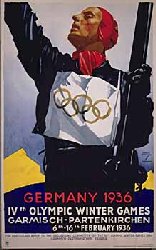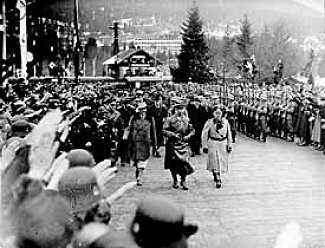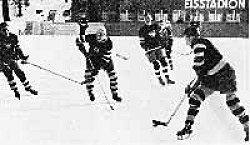|
|
|
|
From February 6 to February 16, 1936, Germany hosted the Winter Olympics at Garmisch-Partenkirchen in the Bavarian Alps. Yielding to international Olympic leaders' insistence on "fair play," German officials allowed Rudi Ball, who was half-Jewish, to compete on the nation's ice hockey team. Hitler also ordered anti-Jewish signs temporarily removed from public view. Still, Nazi deceptions for propaganda purposes were not wholly successful. Western journalists observed and reported troop maneuvers at Garmisch. As a result, the Nazi regime would minimize the military's presence at the Summer Olympics.
|

 Poster for the Winter Games in Garmisch-Partenkirchen. —USHMM #14573/Courtesy of John Loaring
|
|

 The presence of the German military at the Winter Games dampened visitors' mood at the festival. Here, Hitler inspects troops in Garmisch during the Games. February 1936. —USHMM #21761/Süddeutscher Verlag Bilderdienst, Munich, Germany
|
|

 Rudi Ball, who was a half-Jewish German hockey star, participated in the 1936 Winter Games. Here, Ball takes the puck down the ice at an earlier event. St. Moritz, Switzerland. Ca. 1928. —Ulf May, Schläger, Pucks, und Bodychecks (Munich, 1970)
|
|
|
The Museum’s exhibitions are supported by the Lester Robbins and Sheila Johnson Robbins Traveling and Special Exhibitions Fund, established in 1990.
|
